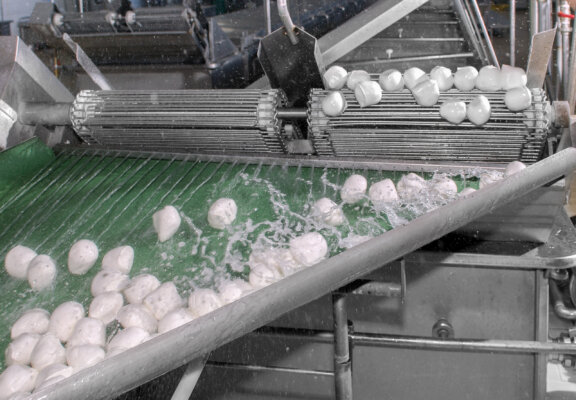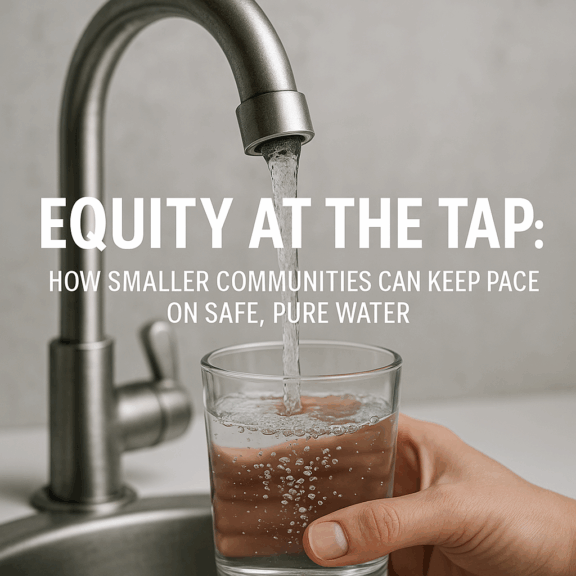Embrace Sustainability with the Power of Water Reuse

Turn challenges into opportunities
Written by: Nathan CW Smith, SVP, Marketing & Lifecycle Leader – Newterra
As global populations continue to rise and climate change impacts become more pronounced, water scarcity and quality have emerged as critical issues. At Newterra, we see an opportunity amidst these challenges: adopting water reuse principles to transform wastewater into a valuable resource.
Understanding the Impacts of Drought and the Global Water Crisis
Our shared water crisis revolves around the availability and quality of freshwater.
Increasing agricultural and industrial demands, coupled with inadequate wastewater treatment and management deteriorate our freshwater sources. Aging infrastructure and the high energy costs associated with conventional water treatment contribute to disproportionate water access globally. The effects of climate change, such as altered precipitation patterns, further exacerbate this crisis by decreasing groundwater recharge.
As an example, the United States Southwest has faced significant and prolonged drought conditions in recent years, with severe impacts on water resources, agriculture, and communities.
- As of 2023, the U.S. Drought Monitor reports that approximately 60% of the Southwestern region is experiencing severe to exceptional drought conditions. This includes states such as California, Arizona, Nevada, New Mexico, and parts of Texas and Colorado.
- Agricultural Impacts:
- The drought has severely impacted agriculture in the Southwest, which is a major producer of fruits, vegetables, nuts, and livestock. California alone, the largest agricultural state in the U.S., has seen billions of dollars in losses due to reduced water availability. In 2021, the California Farm Water Coalition estimated that farmers fallowed over 395,000 acres of cropland, leading to a $1.1 billion loss in crop revenue.
- Livestock producers have also been hit hard, with ranchers facing increased costs for feed and water. Some have had to reduce herd sizes due to inadequate pasture and water resources.
- Economic and Social Impacts: The total economic impact of drought in the Southwest is substantial, with estimates suggesting annual losses ranging from $2.7 billion to $3.3 billion in California alone due to reduced agricultural output, increased firefighting costs, and impacts on water-related recreation.
- Public Health and Safety: Drought conditions have exacerbated wildfire risks, with the Southwest experiencing some of the largest and most destructive fires in its history. The increased frequency and intensity of wildfires have resulted in significant property damage, loss of life, and health issues related to poor air quality.
- Community and Environmental Impacts:
- Water Restrictions: Communities across the Southwest have implemented stringent water restrictions to manage dwindling supplies. In some areas, residents have faced mandatory water use reductions and restrictions on outdoor water usage.
- Ecosystem Stress: The prolonged drought has stressed natural ecosystems, affecting river and stream flows, wetlands, and wildlife habitats. Aquatic species, particularly fish that rely on cold, flowing waters, have been especially vulnerable.
Water Reuse in the U.S.
The landscape of water reuse is evolving rapidly as businesses and governments recognize its importance in addressing water scarcity. Major corporations like Google, Intel, and Coca-Cola have actively discussed and implemented water reuse practices to reduce their environmental footprint and enhance water security. For instance, Intel has committed to restoring 100% of its global water use by 2030, primarily through water reuse and conservation projects.
At the federal level, the Environmental Protection Agency (EPA) has established the Water Reuse Action Plan, promoting collaboration among federal, state, tribal, and local agencies to advance water reuse practices. This plan outlines actions to enhance public health, protect the environment, and promote the sustainable use of water resources.
Several states have also enacted legislation to promote water reuse. California, for example, has been a leader in water reuse initiatives, driven by prolonged droughts and water scarcity. The state has developed stringent regulations and guidelines for the safe reuse of treated wastewater for agricultural irrigation, industrial processes, and groundwater recharge. Similarly, Texas and Florida have implemented policies and programs to encourage water reuse, recognizing its potential to alleviate pressure on freshwater sources and ensure long-term water sustainability.
These efforts at the corporate, federal, and state levels reflect a growing commitment to embracing water reuse as a viable solution to the water crisis. By integrating water reuse practices, the U.S. can set a precedent for sustainable water management and inspire global adoption of circular water principles.
Embracing Water Reuse
At Newterra, we believe that wastewater is not a burden but a resource waiting to be utilized. By capturing, treating, and reusing water within a closed loop, we can minimize waste and reduce reliance on freshwater sources.
Achieving water reuse hinges on three key pillars: treating and repurposing wastewater for applications such as irrigation, industrial processes, and aquifer replenishment; extracting valuable resources like nutrients and energy from wastewater; and implementing technologies and practices to reduce water consumption and enhance efficiency.
Wastewater as a Resource
Viewing wastewater as a resource rather than a liability offers numerous advantages. Treating and reusing wastewater can lower water-use ratios in manufacturing, improve overall water quality, and provide safe water access. For businesses, this approach translates into economic, environmental, social, and risk-mitigation benefits.
The Benefits of Embracing Water Reuse
Water reuse provides various benefits, which can be realized at different scales, from individual homes to city-wide implementations. By adopting water reuse practices, businesses can enhance water security, improve their reputation, achieve economic efficiency, and reach sustainability goals.
- Enhancing Water Security: Businesses can better withstand water shortages and mitigate risks in water-stressed regions, ensuring operational continuity and greater community water security.
- Improving Reputation: Consumers increasingly care about the environmental impact of their purchases. Businesses prioritizing sustainability through water reuse can enhance their corporate reputation and better connect with customers.
- Providing Economic Efficiency: Recovering valuable resources from wastewater, such as nutrients and energy, unlocks new revenue streams, reduces operational costs, and improves efficiency.
- Reaching Sustainability Goals: Embracing water reuse helps achieve climate and water goals, including lowering emissions and improving water efficiency.

Implementing Water Reuse Practices
While the benefits of water reuse are clear, implementing these practices may seem daunting. However, with the right approach, businesses can successfully integrate water reuse into their operations.
Our clients who are interested in adopting sound water reuse practices should begin by conducting comprehensive water audits to uncover inefficiencies and identify the most valuable opportunities for reuse. Investing in advanced onsite wastewater treatment technologies is essential for reclaiming process water and unlocking valuable resources, enhancing operational efficiency and sustainability. Continuous monitoring then to track water-use ratios and maintain optimal water management practices over time preserves ongoing value capture. Finally, building strong collaborations and partnerships with stakeholders across the value chain will accelerate the adoption and integration of water reuse practices, driving sustainable change throughout and beyond their organization.
Newterra’s Technologies for Water Reuse
At Newterra, we offer a suite of reliable and proven technologies that enable businesses to manage and optimize their water resources efficiently. Our Membrane Bioreactors (MBRs) combine biological treatment with membrane filtration to produce high-quality effluent suitable for reuse, making them ideal for industrial and municipal applications. Our Reverse Osmosis Systems remove dissolved salts and impurities, providing clean, high-purity water essential for various processes and wastewater recycling.
Our Modular Treatment Systems offer flexibility and scalability, allowing for customized wastewater treatment tailored to specific water quality requirements. Advanced Oxidation Processes (AOPs), utilizing oxidants like ozone and hydrogen peroxide, effectively degrade organic contaminants and pathogens, ensuring the treated water is safe for reuse.
Our Ozone Sparge Remediation Systems, originating from our H2O Engineering acquisition, are used for groundwater remediation and advanced oxidation, promoting contaminant breakdown and enhancing water quality. Electrodeionization (EDI) Systems provide continuous deionization, producing high-purity water without chemical regeneration, ideal for ultra-pure water applications.
Newterra’s Ion Exchange Vessels remove specific ions, such as hardness ions and contaminants like nitrate and arsenic, crucial for polishing treated water to meet stringent reuse standards. Our Condensate Polishers remove impurities from condensate return systems, enabling water reuse in boiler feedwater applications and improving steam generation efficiency.
Beyond individual technologies, Newterra offers comprehensive lifecycle solutions, including design, installation, operation, and maintenance services. This holistic approach ensures optimized performance and longevity of water reuse systems, helping businesses transform wastewater into a valuable resource and promoting sustainable water management for a resilient future.
Newterra’s Commitment to Water Reuse
At Newterra, we are committed to providing innovative wastewater treatment solutions that enable businesses to embrace water reuse. Our technologies are designed to treat process water for reuse and reduce overall freshwater consumption, helping businesses achieve long-term sustainability and growth.
By harnessing the power of water reuse, we can turn challenges into opportunities and pave the way for a sustainable future.


